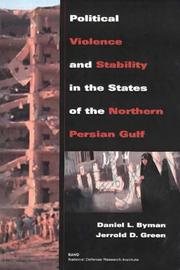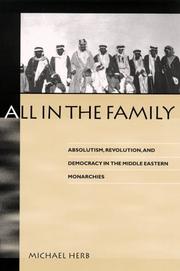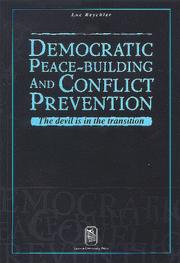| Listing 1 - 6 of 6 |
Sort by
|

ISBN: 0833043390 0585245150 9780585245157 9780833043399 9780833027269 0833027263 0833027263 Year: 1999 Publisher: Santa Monica, CA Rand
Abstract | Keywords | Export | Availability | Bookmark
 Loading...
Loading...Choose an application
- Reference Manager
- EndNote
- RefWorks (Direct export to RefWorks)
Political violence threatens the lives of U.S. soldiers and the stability of U.S. allies throughout the world. This report examines the threat of political violence in the Persian Gulf states of Saudi Arabia, Kuwait, Bahrain, and the United Arab Emirates and the best means of reducing that threat. It assesses sources of discontent, common reasons for anti-regime politicization, potential triggers of violence, and the influence of foreign powers. The report then describes the strategies that regimes in the area have used to interfere with political organization and to counter violence in general. The report concludes by noting implications of political violence for both the United States and its allies in the Gulf, and by assessing the impact of various measures that could reduce violence: enacting political and economic reforms in the Gulf; changing the U.S. presence in the region through new basing and operational approaches; increasing a European role in Gulf security; coercing foreign powers that contribute to violence; strengthening the U.S.-Gulf partnership; and improving military-to-military ties.
Political violence --- Political stability --- Destabilization (Political science) --- Political instability --- Stability, Political --- Consensus (Social sciences) --- Legitimacy of governments --- Violence --- Political crimes and offenses --- Terrorism

ISBN: 0585086788 9780585086781 0791441679 0791441687 9780791441671 9780791441688 Year: 1999 Publisher: Albany : State University of New York Press,
Abstract | Keywords | Export | Availability | Bookmark
 Loading...
Loading...Choose an application
- Reference Manager
- EndNote
- RefWorks (Direct export to RefWorks)
Monarchy --- Despotism --- Political stability --- Democratization --- Petroleum industry and trade --- Energy industries --- Oil industries --- Democratic consolidation --- Democratic transition --- Political science --- New democracies --- Destabilization (Political science) --- Political instability --- Stability, Political --- Consensus (Social sciences) --- Legitimacy of governments --- Absolutism --- Autocracy --- Tyranny --- Authoritarianism --- Dictatorship --- Totalitarianism --- Kingdom (Monarchy) --- Executive power --- Royalists --- Government policy --- Political aspects --- Persian Gulf Region --- Politics and government --- 20th century --- Case studies
Book
Year: 1999 Publisher: Washington, D.C., The World Bank,
Abstract | Keywords | Export | Availability | Bookmark
 Loading...
Loading...Choose an application
- Reference Manager
- EndNote
- RefWorks (Direct export to RefWorks)
May 2000 - A higher share of income for the middle class and lower ethnic polarization are empirically associated with higher income, higher growth, more education, better health, better infrastructure, better economic policies, less political instability, less civil war (putting ethnic minorities at risk), more social modernization, and more democracy. Modern political economy stresses society's polarization as a determinant of development outcomes. Among the most common forms of social conflict are class polarization and ethnic polarization. A middle class consensus is defined as a high share of income for the middle class and a low degree of ethnic polarization. A middle class consensus distinguishes development successes from failures. A theoretical model shows how groups- distinguished by class or ethnicity - will under-invest in human capital and infrastructure when there is leakage to another group. Easterly links the existence of a middle class consensus to exogenous country characteristics such as resource endowments, along the lines of the provocative thesis of Engerman and Sokoloff 1997 that tropical commodity exporters are more unequal than other societies. Easterly confirms this hypothesis with cross-country data. This makes it possible to use resource endowments as instruments for inequality. A higher share of income for the middle class and lower ethnic polarization are empirically associated with higher income, higher growth, more education, better health, better infrastructure, better economic policies, less political instability, less civil war (putting ethnic minorities at risk), more social modernization, and more democracy. This paper - a product of Macroeconomics and Growth, Development Research Group - is part of a larger effort in the group to study the determinants of growth. The author may be contacted at weasterly@worldbank.org.
Class Polarization --- Cross-Country Data --- Cross-Country Differences --- Cross-Country Income --- Development Outcomes --- Development Successes --- Economic Development --- Economic Growth --- Emerging Markets --- Exogenous Country Characteristics --- Human Capital --- Income --- Income Differences --- Inequality --- Macroeconomics and Economic Growth --- Middle Class --- Middle Class Consensus --- Political Community --- Political Economy --- Political Instability --- Poverty Reduction --- Private Sector Development --- Resource Endowments --- Social Conflict
Book
Abstract | Keywords | Export | Availability | Bookmark
 Loading...
Loading...Choose an application
- Reference Manager
- EndNote
- RefWorks (Direct export to RefWorks)
August 1995 - Problems associated with Sub-Saharan Africa's slow growth are low school attainment, political instability, poorly developed financial systems, large black-market exchange-rate premia, large government deficits, and inadequate infrastructure. Improving policies alone boosts growth substantially. But if neighboring countries adopt a policy change together, the effects on growth are more than double what they would have been if one country had acted alone. Africa's economic history since 1960 fits the classical definition of tragedy: potential unfulfilled, with disastrous consequences. Easterly and Levine use one methodology - cross-country regressions - to account for Sub-Saharan Africa's growth performance over the past 30 years and to suggest policies to promote growth over the next 30 years. They statistically quantify the relationship between long-run growth and a wider array of factors than any previous study. They consider such standard variables as initial income to capture convergence effects, schooling, political stability, and indicators of monetary, fiscal, trade, exchange rate, and financial sector policies. They also consider such new measures as infrastructure development, cultural diversity, and economic spillovers from neighbors' growth. Their analysis: Improves substantially on past attempts to account for the growth experience of Sub-Saharan African countries; Shows that low school attainment, political instability, poorly developed financial systems, large black-market exchange-rate premia, large government deficits, and inadequate infrastructure are associated with slow growth; Finds that Africa's ethnic diversity tends to slow growth and reduce the likelihood of adopting good policies; Identifies spillovers of growth performance between neighboring countries. The spillover effects of growth have implications for policy strategy. Improving policies alone boosts growth substantially, but if neighboring countries act together, the effects on growth are much greater. Specifically, the results suggest that the effect of neighbors' adopting a policy change is 2.2 times greater than if a single country acted alone. This paper - a joint product of the Macroeconomics and Growth Division and the Finance and Private Sector Development Division, Policy Research Department - is part of a larger effort in the department to understand the link between policies and growth. The study was funded by the Bank's Research Support Budget under the research project Patterns of Growth (RPO 678-26).
Black Market --- Business Cycle --- Country Regressions --- Currencies and Exchange Rates --- Economic Growth --- Economic Theory and Research --- Educational Attainment --- Exchange Rate --- Finance and Financial Sector Development --- Financial Development --- Financial Sector --- Financial Systems --- Growth --- Growth Performance --- Growth Rate --- Growth Rates --- Health, Nutrition and Population --- Inequality --- Long-Run Growth --- Macroeconomics and Economic Growth --- Nutrition --- Per Capita Income --- Policy Change --- Policy Research --- Political Instability --- Political Stability --- Poor Countries --- Poor Growth --- Poverty Reduction --- Pro-Poor Growth

ISBN: 9061869854 Year: 1999 Publisher: Leuven Leuven university press
Abstract | Keywords | Export | Availability | Bookmark
 Loading...
Loading...Choose an application
- Reference Manager
- EndNote
- RefWorks (Direct export to RefWorks)
International relations. Foreign policy --- Political systems --- Pacifisme --- Politiek --- Politique --- Academic collection --- 327.57 --- Conflict management --- Democracy --- Democratization --- Political stability --- Peace-building --- #gsdb5 --- #SBIB:327.5H20 --- #SBIB:327.1H10 --- #SBIB:324H20 --- conflicten --- democratie --- vrede --- oorlogen --- 399.22 --- Building peace --- Peacebuilding --- Peace --- Peacekeeping forces --- Destabilization (Political science) --- Political instability --- Stability, Political --- Consensus (Social sciences) --- Legitimacy of governments --- Democratic consolidation --- Democratic transition --- Political science --- New democracies --- Self-government --- Equality --- Representative government and representation --- Republics --- Conflict control --- Conflict resolution --- Dispute settlement --- Management of conflict --- Managing conflict --- Management --- Negotiation --- Problem solving --- Social conflict --- Crisis management --- Vreedzame coexistentie. Oorlogspreventie --(politiek vredesonderzoek,polemologie, irenologie zie {355.01}) --- Vredesonderzoek: algemeen --- Internationale betrekkingen: theorieën --- Politologie: theorieën (democratie, comparatieve studieën….) --- vraagstukken over oorlog en vrede --- 327.57 Vreedzame coexistentie. Oorlogspreventie --(politiek vredesonderzoek,polemologie, irenologie zie {355.01})
Book
ISBN: 2843980615 Year: 1999 Volume: *6 Publisher: Rennes Apogée
Abstract | Keywords | Export | Availability | Bookmark
 Loading...
Loading...Choose an application
- Reference Manager
- EndNote
- RefWorks (Direct export to RefWorks)
Human rights --- Political stability --- Droits de l'homme (Droit international) --- Stabilité politique --- European Union --- Membership --- European Union countries --- Turkey --- Pays de l'Union européenne --- Turquie --- Foreign economic relations --- Relations économiques extérieures --- Union européenne --- Relations --- Adhésion --- Relations extérieures --- -Human rights --- -Political stability --- -327.39 EUR --- 327 EUR <560> --- Destabilization (Political science) --- Political instability --- Stability, Political --- Consensus (Social sciences) --- Legitimacy of governments --- Basic rights --- Civil rights (International law) --- Rights, Human --- Rights of man --- Human security --- Transitional justice --- Truth commissions --- Law and legislation --- -Turkey --- -EU countries --- Euroland --- Europe --- -Foreign economic relations --- Stabilité politique --- Pays de l'Union européenne --- Relations économiques extérieures --- 327.39 EUR --- E.U. --- EU countries --- Foreign relations --- Membership. --- Relations extérieures --- Union européenne --- Adhésion
| Listing 1 - 6 of 6 |
Sort by
|

 Search
Search Feedback
Feedback About UniCat
About UniCat  Help
Help News
News